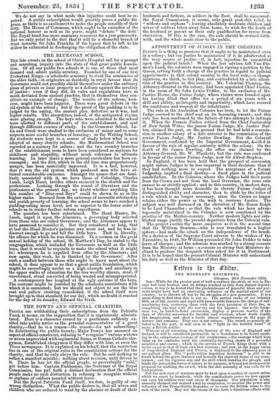THE BLUE-COAT SCHOOL.
TEE late events in the school of Christ's Hospital call for a prompt and. searching inquiry into the, state of that great public founda- tion., Of all our public free schools it is one of those that most demand and admit public scrutiny. Founded by one of our first Protestant Kings—a scholastic seminary to rival the seminaries of the older, faith—it originates so decidedly in royal favour that its Governors could not:possibly shield themselves under the ordinary pleas of private or local property as a defence against the scrutiny of justice : even if they did, its rules and regulations have so much deviated-from ancient practice, that in themselves they con- stitute an example of change. The results of the reform, how- ever, might have been happier. There were great defects in the old system of the school ; but if the proof of the pudding is to be "udged by the eating, the ancient plan, defective as it was, had • her results. The absurdities, indeed, of the antiquated regime were glaring enough. The boys who were admitted to the school were allotted to different parts of the establishment, and sent through different courses of study. In the Grammar School, La- tin and Greek, were studied to the exclusion of minor and in some respects more useful branches of learning ; in the Writing School, the students were kept to a course of study below what is now adopted at many charity schools; the Mathematical School was regarded as a nursery, for sailors ; and the two country branches of the establishment seem to have been considered as asylums for sickliness and stupidity, without much reference to ultimate learning. In later times a more general curriculum has been en- couraged ; and the diet, which in the old time was preposterously meagre, has been materially improved. It is a fact, however, that it was the old system which produced men who have at- tained considerable eminence. Amongst the names that are fami- liarly associated with it, we have those of Coleridge, Charles Lamb, Leigh Hunt, besides others eminent in the church and the professions. Looking through the round of literature and the professions at the present day, we doubt whether anything like this number of " Blue-coat Boys" could be shown to us in the higher ranks. Rescued from the extremes of monastic scholarship and parish poverty of learning, the school seems to have reached a pudding-eating mean level, not so superior to the lower order of schools as to render further reform superfluous.
The question has been entertained. The Head Master, Dr. Jacob, urged it upon the Almoners, a governing body selected from those who are called Governors; and the Almoners appear to have promised to consider it. But they considered so long, that at last the Head Master's patience was worn out, and he was in- discreet enough to go and tell the little boys. That is, literally, the offence for which he was dismissed. In a sermon on the great annual holiday of the school, St. Matthew's Day, he stated to the cengregation, which included the Governors as well as the little boys, that it would be requisite to make the school what it might be: whereupon he is expelled from office by the Almoners; and now again, this week, he is thanked by the Governors! After such a conflict between those who ought to know most about the school, it does appear to us that a great public foundation, which might be exceedingly useful as a high example and auxiliary in the upper walks of education for the less wealthy classes, must, if unreformed, stand convicted of being wasted and misappropriated. -A. contemporary has laughed at the ugly costume of the boys. The costume might be justified by the scholastic associations with which it is connected; but we should not object to see the blue coat and yellow stocking remodelled, if the school itself were brought pp to that standard for our day, which no doubt it reached for the day of its founder, Edward the Sixth.


























 Previous page
Previous page